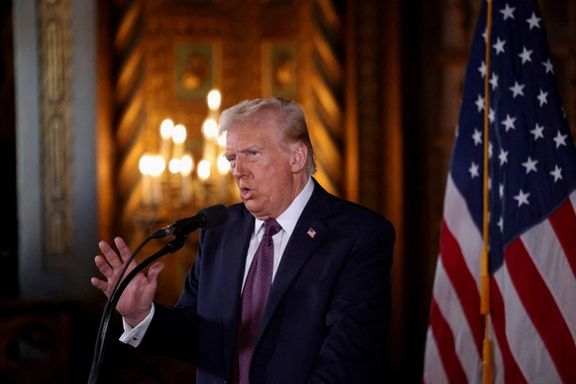Ahead of Trump presidency, Iran sends mixed messages on US talks

US President-elect Donald Trump needs to show he will keep his word before Iran will consider talks with his administration, Iranian President Masoud Pezeshkian told reporters on Wednesday.
"If Trump proves he follows through on his words, we will engage in talks with him," President Pezeshkian said during a cabinet meeting.
His comment followed the foreign minister's statement on state television the previous day, saying that Tehran would not engage in talks with the US unless Washington first rejoined the 2015 nuclear deal, the Joint Comprehensive Plan of Action (JCPOA).
“We will not negotiate with the United States until it returns to the JCPOA. We will also continue consultations with China and Russia, considering them two key members of the JCPOA,” Foreign Minister Abbas Araghchi stated.
This is not the first occasion on which the Islamic Republic has insisted on evidence of US intentions prior to entering into negotiations.
Since the Trump administration withdrew from the JCPOA in 2018 and imposed severe economic sanctions, Tehran has repeatedly called for the easing of these sanctions as a sign of Washington's goodwill.
Iranian and international media, along with analysts, however, anticipate Trump to intensify sanction enforcement to compel Tehran into make concessions.
NBC is scheduled to air an interview with President Pezeshkian on Wednesday, where, according to his aide, he will convey Tehran’s willingness to engage in talks with the Trump administration.
This apparent divergence in messaging has drawn attention and criticism inside Iran.
In a short version of the interview NBC released on Tuesday, Pezeshkian also denied that the Islamic Republic had any plans to assassinate Donald Trump for the 2020 killing of Qassem Soleimani, a pivotal figure who led Tehran's military operations across the Middle East.
Efforts by the Biden administration to restore the 2015 nuclear deal included extensive indirect talks with Tehran in 2021–2022, which stalled after Russia's invasion of Ukraine. Russia, a key JCPOA signatory, played a significant role in those negotiations.
Iran's government is under increasing pressure from a worsening economic crisis and regional military setbacks in the Middle East over the past year.
Inside Iran, Trump’s return to the White House has led many officials, analysts, and state media to advocate for preemptive talks with the incoming administration to prevent further strain in relations with the US.
Araghchi's comments elicited strong criticism from Hamid Abutalebi, a political advisor to former President Hassan Rouhani. In a post on X, Abutalebi charged the Pezeshkian administration with inconsistency and a lack of clarity in its foreign policy approach.
“It seems that the esteemed government is engaging in ‘political self-deception,’” Abutalebi wrote. “On one hand, the President sends a message signaling a willingness to negotiate, while on the other, his Foreign Minister, in tonight's interview, takes a stance against the President's position, effectively neutralizing it.”